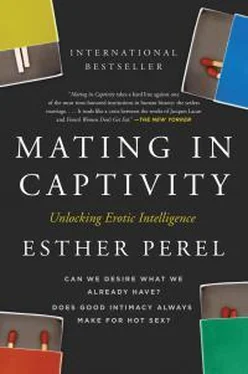In truth, we never know our partner as well as we think we do. Mitchell reminds us that even in the dullest marriages, predictability is a mirage. Our need for constancy limits how much we are willing to know the person who’s next to us. We are invested in having him or her conform to an image that is often a creation of our own imagination, based on our own set of needs. “One thing about him is that he’s never anxious. He’s like a rock. I’m so neurotic.” “He’s too much of a wimp to leave me.” “She doesn’t put up with any of my shit.” “We’re both very traditional. Even though she has a PhD, she really likes staying home with the kids.” We see what we want to see, what we can tolerate seeing, and our partner does the same. Neutralizing each other’s complexity affords us a kind of manageable otherness. We narrow down our partner, ignoring or rejecting essential parts when they threaten the established order of our coupledom. We also reduce ourselves, jettisoning large chunks of our personalities in the name of love.
Yet when we peg ourselves and our partners to fixed entities, we needn’t be surprised that passion goes out the window. And I’m sorry to say that the loss is on both sides. Not only have you squeezed out the passion, but you haven’t really gained safety, either. The fragility of this manufactured equilibrium becomes obvious when one partner breaks the rules of the contrivance and insists on bringing more authentic parts of himself into the relationship.
This is what happened to Charles and Rose. Married for almost four decades, they’ve had a lot of time to define one another. Charles is mercurial, a provocateur, and a playful seducer. He is a passionate man in need of a container, someone to help him channel the unbridled energies that distract him. “If it weren’t for Rose, I don’t think I would have the career and family I have today,” he says. Rose is strong, independent, and clearheaded. She possesses a kind of natural equanimity that calibrates his intemperateness. As they describe it, she is the solid; he, the fluid. The few times Rose ventured into passionate territory before meeting Charles, she found it overwhelming. It left her depleted and unhappy. What he represents for her is passion that she doesn’t have to own. What scares Rose is the loss of control and what scares Charles is that he enjoys the loss of control too much. The complementarity of their relationship allows them to flourish within a bounded space.
This fertile arrangement worked reasonably well until the day it didn’t. As so often happens, there is a moment when we recognize that what we’re doing is no longer working. Often it follows significant events that make us review the meaning and the structure of our lives. Suddenly, the compromises that worked so well yesterday become sacrifices we no longer want to brook today. For Charles, a succession of losses—the death of his mother, the death of a close friend, and a scare regarding his own health—have made him keenly aware of his own mortality. He wants to charge at life, to ply his vitality, to reconnect with the exuberance that he’s kept in check in order to be with Rose. He can no longer bear to keep that part of himself tucked away, even in exchange for the solid ground Rose offers. But every time he tries to talk about this hunger, Rose feels threatened and dismisses him. “You’re having another midlife crisis? What are you going to do, buy a red Trans-Am?”
Rose and Charles have both had their nonmonogamous interludes over the years. The facts were known, the details were not; and they put these episodes behind them. Or at least Rose did. “I thought we were past our turbulent years. We’re in our sixties, for God’s sake,” she moans.
“And that precludes what?” I ask her.
“Hurting me! Risking our marriage! I’ve come to accept the terms of our relationship. Why can’t he?”
“And those terms are?”
“When we married, we loved each other very much. We still do. But, shall we say, we had both known stronger passions. Charles came out of it disillusioned—the high intensity was always short-lived, and he was left with women he didn’t have much in common with. I came out of it relieved. I got too lost in it. We talked about it back then, that we were both looking for something more enduring and a little calmer.” Rose goes on to explain that she and Charles had other goals for their marriage—companionship, intellectual stimulation, physical and emotional care, support. “We really valued what we had found with each other.”
Rose grew up poor. Her father ran a junkyard in rural Tennessee. Today she has a corner office on the fifty-sixth floor overlooking Madison Avenue in Manhattan. “My hillbilly town wasn’t exactly supportive of girls with ambition, and I had a lot. When I met Charles, I knew he was different. I could be with him and he would let me do my own thing. In the early 1960s, that was a big deal.”
“What did you think was going to happen sexually? That was a big deal in the sixties, too,” I say.
“I was OK with our sex life. I thought it was fine, even nice,” she tells me. “I’ve always known that for Charles it wasn’t enough, but I expected him to deal with it.”
In a private session with Charles a few weeks later, Charles gives me his take on things. “Sex with Rose is nice, but it’s always been kind of flat. Sometimes I can deal with the low intensity; other times it’s been unbearable. I’ve gone online, I’ve gone outside of the marriage, I’ve gone to Rose. Mostly I tried to squelch it, because there doesn’t seem to be room for this between us. But I don’t want to do that anymore. Life is too short. I’m getting older. When I feel erotically alive, as you call it, I don’t worry about death and I don’t worry about my age, at least for a few moments.
“Frankly, I’m surprised at her reaction,” he continues. “It’s been years since she was interested in sex. This may sound strange, but I honestly didn’t think she’d feel so strongly about my being involved with other women. Even though I’m not exclusive any longer, I’m as emotionally faithful and committed as I’ve always been. I don’t want to hurt her, and I certainly don’t want to leave her, but something had to change for me.”
Charles isn’t behaving according to the script, but then neither is Rose. She is fragile and afraid, not the invincible woman Charles needs her to be. Just as they had banished his seductiveness, they had also suppressed her vulnerability. They have outgrown their respective roles, and they are in a crisis.
Unbeknownst to them, this may be the greatest opportunity for expansion they’ve had in years, for it allows them to express parts of themselves that have long been denied. It’s tiresome to have to be in control all the time, and Rose was due for a break. It’s equally draining to feel erotically impoverished, and Charles’s refusal to tolerate this situation was his first step in bringing more authentic parts of himself to Rose. Ironically, in the midst of this emotional turmoil they began making love again after many years apart. Rose’s desire for Charles came back to life in tandem with his interest in other women. The more he eludes her, the more she wants him. And for his part, seeing her care so much about what he does has a profound erotic appeal.
For a long time their relationship operated on a contract of mutuality. They were not to express feelings or needs that exceeded what they had been allocated. They were not to be irrational, insensitive, or greedy. Now, however, they both were making strong claims. They made demands on each other that they didn’t want to give up on. There was a lot of pain, but at the same time there was a vibrancy that neither could deny.
Читать дальше










